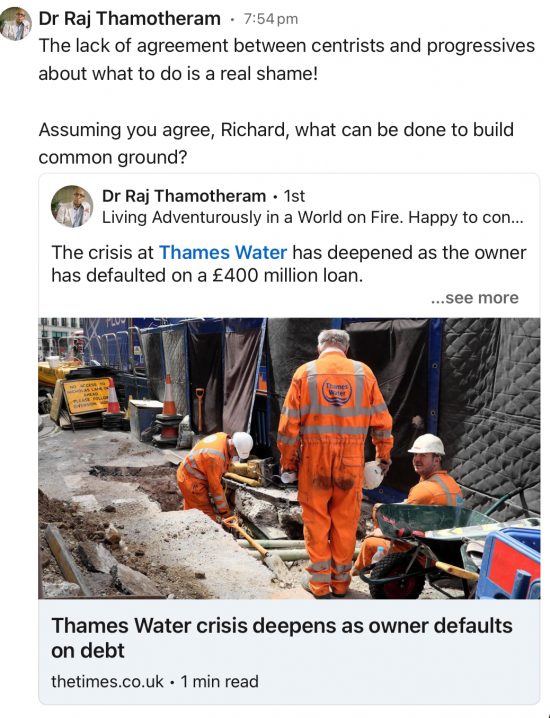With the devolopment of neo-liberalism, ideas like democracy, justice, equality, and community have been shattered. Liberal democracy became authoritarian liberal democracy, which is mostly authoritarian. In some nations, such as Germany, the drift is going rapidly to fascicm – just see the Greens – to secure power for the few.
Richard Murphy is an economic justice campaigner. Professor of Accounting, Sheffield University Management School. Chartered accountant. Co-founder of the Green New Deal as well as blogging at Funding the Future
Cross-posted from Richard Murphy’s blog ‘Funding the Future’

This item was posted on LinkedIn last night by Dr Raj Thamotheram, with whom I have been in occasional contact for quite a long time.

As is apparent, the message was about the failure of Thames Water’s holding company to repay its debt, but what it actually made me think about was the claim that there was a difference between the position of centrists and progressives, which seems at least as interesting.
My problem with Raj’s claim is that I don’t think that there are many centrists anymore. I know that those who like to claim that they are moderates on both left and right seek to call themselves centrists, but as far as I can see, they are nothing of the sort. To me, they look like extremists.
It is extreme to believe that markets must supply the solutions to all problems.
It is as extreme to believe that the state must be constrained from undertaking activities that it is both perfectly capable of delivering and which would undoubtedly meet real needs that markets cannot address in society.
It is extreme to believe that the wealthy must be under-taxed because they are the only creators of value in society.
It is extreme to believe that everyone has a duty to work whatever opportunity the ‘market’ offers to them, and whatever their personal situation.
It is extreme to believe that those who do not conform to the markets’ demands are unworthy of support.
And, it is extreme to believe that privately owned, wealth-extracting monopolies should be permitted to operate without hindrance in our society, even though the inevitable consequence is growing inequality and the stifling of real competition, innovation and opportunity.
All these things are at least as extreme as believing that the means of production should all be held in common, which is a view to which I have never subscribed, and which now largely exists as a figment of the imagination of those pro-market extremists who suggest that they are fighting socialism when what they are actually fighting is the mixed economy.
A genuine centrist does not promote the status of the individual above that of the community any more than they promote the interests of the community above that of the individual. Instead, they understand that the two live in constructive tension.
What is more, they will recognise that the relationship between the individual and community will vary for each person and will, of course, be dependent upon the strength of the community in the area in which they live.
Saying so, they will recognise that the real opportunity for choice that society must provide is in that spectrum between meeting needs individually and communally. It is in this spectrum that centrist politics really exists.
That said, a genuine centrist does, in my opinion, believe that it is the duty of the state to ensure that the needs of everyone are met before the capacity of society is used to address wants. That is because the centrist believes that everyone must have a chance to participate in the society of which they should be a part.
The centrist should also, by definition, be able to see themselves as part of a continuum. In other words, the present is not their sole focus, unlike the pro-market extremist, who sees the moment as being their only point of concern. In contrast, the centrist appraises appropriate action in the present, taking into consideration what they know about the future, having learned the lessons of the past. As a result, they cannot, for example, be indifferent to the consequences of climate change, unlike those who prioritise what they think to be market needs, who clearly are.
There is nothing centrist about the behaviour of either the Conservative or Labour parties at present. In my opinion, both are pro-market extremists.
Both see to undermine, belittle and dismiss the power of the state to solve problems.
Each of them seeks to actively constrain its ability to meet need.
Both believe that it is only the private sector that can solve the problems that we face.
The leaderships of both parties ignore the interest of communities across the UK.
Their focus on choice highlights the priority that they give to the individual.
They ignore need and instead promote behaviour that will allow some to satisfy their wants, because those are the people that they associate and identify with.
As a consequence, they permitted bias to wealth within our society, as a result of which they permit a tax system that decidedly under-taxes those with the greatest capacity to pay.
Nothing about the behaviour of either the Conservatives or Labour can in any way be described as centrist. If you dismiss solutions that involve government. If you ignore the importance of community. If you are only interested in the powerful. If you are indifferent to those in need. If you are careless about the future. If inequality does not worry you. If you deliberately treat some as being of no concern. If you do all these things, then you are not a centrist. You are an extremist. In that case, the problem that we face is that at the next general election, what our two largest political parties will give us will be a choice between more or less competent versions of extremism.
I am not an extremist. I am a centrist.
I reject the extremes of those who claim to be pro-market.
I do not think that there is a viable alternative where the state is the answer to all known questions.
I believe that markets, government in all its varieties, individuals, communities, companies, charities and other voluntary organisations all have essential roles to play in our society, and each should be permitted to do what they are best at without crowding out the others because in that way we get the best outcomes.
You would have thought that should be obvious. But the dogmatists who dominate politics at present appear quite unable to comprehend this. For them, there would appear to be only one answer to any question, which is that the market must provide, even though that market that they promote is, itself, rigged in favour of a few.
The truth is that the centre has not held. It has given way to extremism. The need is to rebuild it.


Be the first to comment